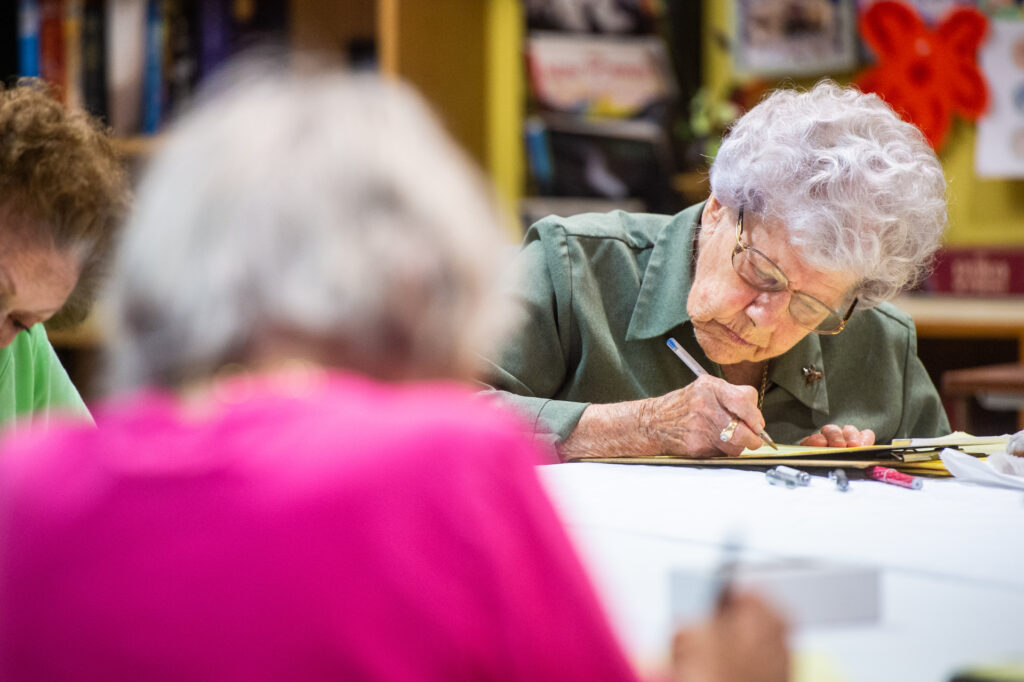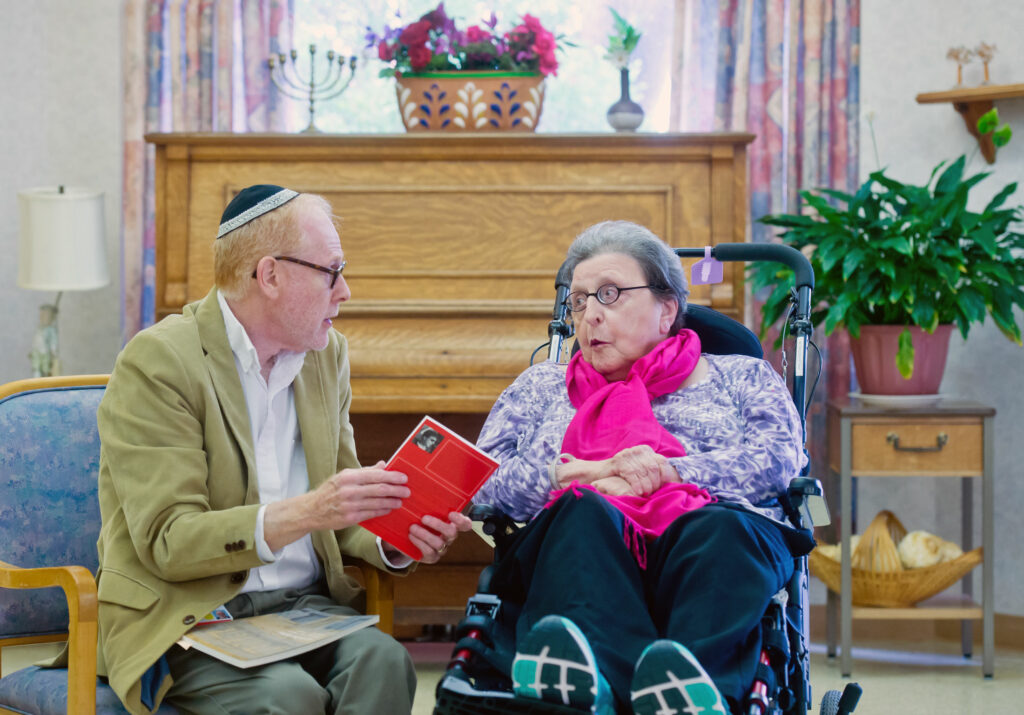While the nation observes Poetry Month every April, our celebration of poetry at San Francisco Campus for Jewish Living extends far beyond one month. At the Jewish Home & Rehab Center, our Life Enrichment team holds regular poetry readings with residents. Last year, Byer Square hosted an intergenerational poetry slam with Frank Residences assisted living residents and the slam poetry team from Tamalpais High School, organized by our Reboot partners, filmmakers Ken Goldberg and Tiffany Shlain and their daughter, Odessa. But it is through writing classes taught by Litquake that our residents are truly inspired to write their own poetry and over the years have created an impressive body of work.

Through their Elder Writing Project, Litquake has been teaching writing classes at SFCJL since 2018. The Elder Writing Project is an outreach project of the Litquake Foundation, bringing creative writing and storytelling workshops to retirement communities across San Francisco and Oakland. Tam Putnam, Assistant Project Director, says her Litquake classes at SFCJL are a delightful privilege to teach. “After reading passages from poetry and prose—classic or contemporary—everyone pulls out a pen to respond to a writing prompt related to the reading. We take a deep dive into memory, feeling, thought, and expression, and I’m always astonished at the work that emerges.”
The participants’ rich oeuvre has included accounts of an unexpected hitchhiking encounter in Ireland; of evading Nazis in Eastern Europe during World War II; of marrying a hypnotic near-stranger; of riding the Steeplechase in Brooklyn; of being a young trans woman in San Francisco in the ’80s; of walking across the Golden Gate Bridge the day it opened in 1937; of family, friends, disasters, and joys. A real camaraderie among the residents comes from their exploration of the creative process together, especially through reading work aloud with the group. One resident says she loves discovering more about her fellow writers each week.
The Litquake team often describe working with our residents as magical. “It brings me so much joy to see them inspired and writing, sparked by the lessons and poems, whether their own poems or stories from their personal history,” says Kevin Dublin, the Elder Writing Project’s Program Director. “One of the reasons I love to be present is because I learn just as much from them. Their experiences are so vast.”

One of our residents is celebrated poet Phyllis Koestenbaum. Phyllis is a poetry and writing prodigy who wrote her first poem at age eight. She has published eight books of poetry and several poems and essays in The Massachusetts Review, Court Green, Witness, Sentence, and more. She earned grants from the National Endowment for the Arts and the California Arts Council and has been a resident at MacDowell, the Fine Arts Work Center in Provincetown, and the Djerassi Foundation. Her poems have been twice selected for the Best American Poetry anthology. She taught poetry at Stanford University, at Foothill College Writer Conference, and privately for many years. Profiled in Jewish Senior Living magazine in 2017, Phyllis moved into the Jewish Home in 2016.
Kevin Dublin remembers the first time he met Phyllis:
My first time at the San Francisco Campus for Jewish Living was just before I began teaching in the Skilled Nursing Facility in 2018. It was after the first session of classes, and the first reading of residents. Everyone was welcoming, and I enjoyed the stories that the residents shared. Just after the reading, I went up to a resident, Phyllis Koestenbaum, who looked a little distraught. I asked if she was okay, and she shared that she had lost the use of her writing hand from a stroke. She wished she could write poems again. I said to her that there were so many ways to write and shared how I compose in my head while walking then write it down later. She said that she didn’t know if she’d ever write again, so I said what I have said for many years to folks, a line from one of my early favorite poems, “there will be time, there will be time.” And to my surprise, she continued with the next line, “…to prepare a face to meet the faces that you meet,” so I followed her with the next line, “there will be time to murder and create,” and she continued while lifting her arm, “and time for all the works and days of hands,” and we traded line for line through the stanza before an enormous smile crossed her face, and she said, “I can’t remember the next line,” and neither could I. We laughed. And after, I asked her to please join the next series of classes. And I knew I had to teach there, to be in the room with these wonderful elders again.
During shelter-in-place in the early days of Covid, when Litquake couldn’t make it in-person to sites, Kevin made a series of videos he posted twice a week to share with elders, in which he read a poem and gave a writing prompt. One of the videos featured a poem, “Juliet,” from Phyllis Koestenbaum’s book Doris Day and Kitschy Melodies. Kevin was moved to buy that book and another, Criminal Sonnets, after talking with Phyllis about her days at Stanford.
Even though more of Kevin’s time is now spent directing and launching other sites than teaching, he still returns to SFCJL to teach when he has an opportunity because he is so devoted to our residents and loves simply to see everyone. Lately, he has been teaching more at Frank Residences, where he frequently brings poetry as a writing prompt, but prose dominates the writing. In a recent class, he taught a lesson on the haibun, a prosimetric form that combines prose and poetry from the tradition of Japanese poetry.
“Litquake is for everyone,” says Frank resident and Elder Writing Project regular, Esther Mugar. “The supportive writers/facilitators provide ideas to guide you or, if you wish, leave you to write as you will. Come out and write!”
Esther and a number of other SFCJL residents participated in Listen To Your Elders, a featured event in Litquake’s 2021 festival.
A Selection of Poems from SFCJL Residents
Esther Mugar After Covid The world may be bigger and brighter after Covid. No parameters, no protocols, no masks after Covid. How I long to escape the confines of this building to see what has changed, what has survived after Covid. My city of hills, lightly hued under ever-morphing skies; will this landscape, though unkempt, remain unmarred by Covid? What of the spirit, the quirkiness, the live-in-the-moment sensibility of this place; will it be muted, damaged, even destroyed by Covid? Is this how the world will end, “with a whimper”? Or will science and human fortitude triumph and bring an end to Covid?
Fredi Aks 4 HAIKUS If I could write poems I would write about myself. Not easy to do! Why is it so hard? Seeing inside to find truths Is not ever straightforward. I discover good, And kindness, and humor there, As well as some sadness too. What else might be there? Too much to write in a day. It could take immense courage.
Nina Youkelson Reading the Poem Fierce little teacher, Already, at eleven, Two inches taller than she, Exploded my prepubescent world And shot me into another realm. Patricia Cunningham, Seventh-grade silent one, Hiding behind the puffy white face, Arms, Body, In a dress her mother, Poor and Irish, Made for her, Was chosen by the fierce, brilliant little teacher To read a poem in front of the class. The sunlight poured from the large window As Patricia stood up, book in hand, Illuminating her in ways that I know she had seen in church, And read, surprisingly strongly— “Chicago.” Carl Sandberg’s voice Came through Patricia’s mouth In a way he would have loved. My life was never the same.
Frank Bittner Stones Desert stones— Solid, hard, crumbly to dust. Many colors—red, gold, orange, green, Colorless gray. Massive, tiny. Silicon, carbon, iron atoms.
Gertrude Warshaw Summer Swimming, love it At outdoor pools, or at the YMCA for women on Sutter Street. The beautiful bathing suits and Great food, the cool dresses and shorts. Ocean Beach near Cliff House, Saltwater, cold but good. In the warm sun, skating out in front of our house Or in the park or backyard.
Phyllis Koestenbaum Penny I am a shiny person, perfect, a coin. All I can buy is penny candy. I’m eager to spend this coin. It’s going to get unshiny even in my pocket, so why not just spend it and get it over with? If I have a friend, I will ask if he or she wants to help me spend this coin. The girl says yes, the boy says no.
It is through the support from our generous community of individuals and foundations that we are able to bring programs like Litquake’s Elder Writing Project to our residents.
